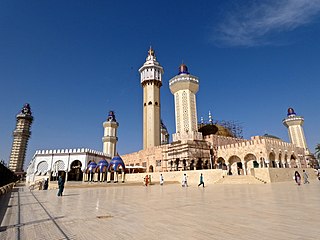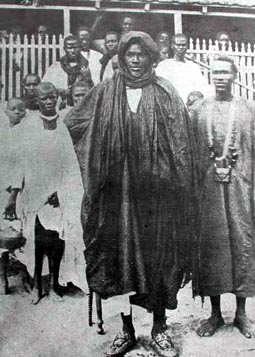
The Mouride brotherhood is a large tariqa most prominent in Senegal and The Gambia with headquarters in the city of Touba, which is a holy city for the order. Adherents are called Mourides, from the Arabic word murīd, a term used generally in Sufism to designate a disciple of a spiritual guide.The beliefs and practices of the Mourides constitute Mouridism. Mouride disciples call themselves taalibé in Wolof and must undergo a ritual of allegiance called njebbel, as it is considered highly important to have a sheikh "spiritual guide" in order to become a Mouride. The Mouride brotherhood was founded in 1883 in Senegal by Amadou Bamba. The Mouride make up around 40 percent of the total population, and their influence over everyday life can be seen throughout Senegal.

Ahmadu Bamba Mbacke also known to followers as the Servant of the Messenger and Serigne Touba or "Sheikh of Touba", was a Sufi saint and religious leader in Senegal and the founder of the large Mouride Brotherhood.

Touba is a city in central Senegal, part of Diourbel Region and Mbacké district. With a population of 1,120,824 in 2023, it is the second most populated Senegalese city after Dakar. It is the holy city of Mouridism and the burial place of its founder, Shaikh Ahmadou Bàmba Mbàcke. Next to his tomb stands a large mosque, completed in 1963.

Serigne Saliou Mbacké was a saint (Wali) and Grand Marabout (leader) of the Mouride movement in Senegal from 1990 until his death in 2007.
Mbacké is a city and urban commune in central Senegal, located 190 km (118 mi) east of Dakar. It is the capital of an administrative department in the Diourbel region. Along with the nearby city of Touba, Mbacké forms an urban conurbation whose population currently stands at 1,222,275, making it Senegal's second largest agglomeration. It is connected to Dakar and Touba by the N3 road.

Islam is the predominant religion in Senegal. 97 percent of the country's population is estimated to be Muslim. Islam has had a presence in Senegal since the 11th century. Sufi brotherhoods expanded with French colonization, as people turned to religious authority rather than the colonial administration. The main Sufi orders are the Tijaniyyah, the Muridiyyah or Mourides, and to a lesser extent, the pan-Islamic Qadiriyyah and the smaller Layene order. Approximately 1% are Shiites.

Mbacké department is one of the 46 departments of Senegal, and one of the three constituting the Diourbel region.

Nioro du Rip department is one of the 46 departments of Senegal, located in the Kaolack region.

Sheikh Ibrahima Fall (1855–1930) was a disciple of Sheikh Aamadu Bàmba Mbàkke, founder of the Mouride Brotherhood movement in West Africa. Well known in the Mouride Brotherhood, Ibrahima Fall established the influential Baye Fall movement.
El Hadji Serigne Mouhamadou Lamine Bara Mbacké, or Sheikh Bara Mbacké was the Grand Marabout of the Mouride movement in Senegal from 2007 until his death in 2010. The movement is prominent outside Senegal as well, in places such as New York, Paris and Rome.

Maad a Sinig Kumba Ndoffene Fa Ndeb Joof, also known as Kumba Ndoffene Joof II or Bour Sine Coumba Ndoffène Fandepp Diouf, was a King of Sine. Maad a Sinig translates as "King of Sine", Maad meaning king in the Serer language. The surname Joof is the English spelling in the Gambia. Diouf is the French spelling in Senegal.

Café Touba is a coffee beverage that is a popular traditional drink from Senegal that is also consumed in Guinea-Bissau, and is named for the city of Touba, Senegal.

The Great Mosque of Touba is a mosque in Touba, Senegal. It was founded by Ahmad Bamba in 1887 and completed in 1963. Bamba died in 1927 and was interred inside the mosque. Since his death the mosque has been controlled by his family. It is the largest building in the city and one of the largest mosques in Africa, with a capacity of 7,000. It is the site of a pilgrimage, the Grand Magal of Touba.
Mame Diarra Bousso (1833–1866) is a Sufi saint from Senegal. The annual pilgrimage to the site of her death and mausoleum is the only pilgrimage dedicated to a woman in Senegal. She was the mother of Amadou Bamba.
The Grand Magal of Touba is the annual religious pilgrimage of the Senegalese Mouride Brotherhood, one of the four Islamic Sufi orders of Senegal. On the 18th of Safar, the second month of the Islamic calendar, pilgrims gather in the holy Mouride city of Touba to celebrate the life and teachings of Amadou Bamba, the founder of the brotherhood.
Serigne Sidi Moukhtar Mbacké was a Senegalese religious leader. He served as the Caliph of the Mouride movement, a large Sufi order based in Senegal, from 1 July 2010 until his death on 9 January 2018.
Serigne Mouhamadou Moustapha Mbacké was a Senegalese religious leader. He served as the first Caliph of the Mouride brotherhood, a large Sufi order based in Senegal, from 1927 until his death on July 13, 1945. He was the first son of Sufi saint and religious leader Sheikh Amadou Bamba.
Serigne Mouhamadou Fallou Mbacké was a Senegalese religious leader. He served as the second Caliph of the Mouride brotherhood, a large Sufi order based in Senegal, from 1945 until his death in 1968. He was the son of Sufi saint and religious leader Sheikh Amadou Bamba.
Serigne Abdou Ahad Mbacké was a Senegalese religious leader. He served as the third Caliph of the Mouride brotherhood, a large Sufi order based in Senegal, from 1968 until his death in 1989. He was the son of Sufi saint and religious leader Sheikh Amadou Bamba.
Serigne Abdou Khadr Mbacké was a Senegalese religious leader. He served as the fourth Caliph of the Mouride brotherhood, a large Sufi order based in Senegal, from 1989 until his death in 1990. He was the son of Sufi saint and religious leader Sheikh Amadou Bamba.










